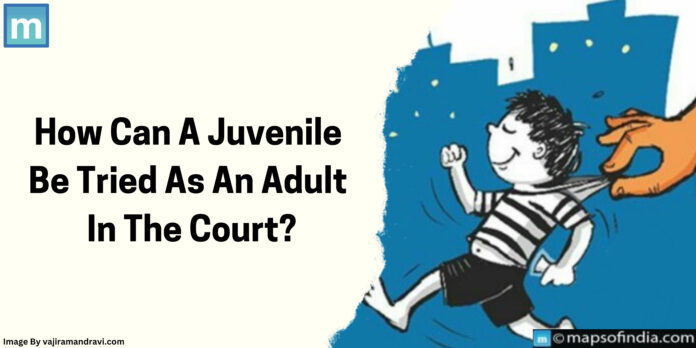Treating Juveniles as Adults
Guidelines for conducting a preliminary assessment under Section 15 of the Juvenile Justice Act, 2015 (JJ Act, 2015) were prepared by the National Commission for the Protection of Children (NCPCR).
- The main goal of the guidelines is to determine whether or not the accused should be regarded as a juvenile throughout the trial.
- This first assessment will ascertain if a minor may be prosecuted as an adult.
Determining the Age:
- The Juvenile Justice Act, 2015 Act (JJ Act) defines a kid as an individual who has not turned 18 years of age.
- According to the Juvenile Justice Act of 2015, juveniles between the ages of 16 and 18 who commit serious offences may be prosecuted as adults.
- Section 15 of the JJ Act requires the Board to do a preliminary assessment of the child’s mental and physical ability to commit the heinous Act to ascertain whether the child has attained or is older than sixteen years of age.
Heinous Offences:
- “Heinous offences” are defined as crimes for which the Indian Penal Code, 1860 or any other relevant legislation mandates a minimum sentence of seven years in jail or more, under Section 2(33) of the JJ Act 2015.
- For an offence to be classified as a “heinous offence,” it must carry a minimum punishment of seven years in prison or more.
Initial Evaluation and the Function of the Juvenile Justice Board (JJB)
The primary goal of the preliminary assessment is to determine whether a juvenile between the ages of 16 and 18 should be tried as an adult in the case of a severe offence.
- There are two key situations that require preliminary examination. First, the offence qualifies as a “heinous” offence under the Act. Second, the child being alleged to have committed the crime is between sixteen and eighteen.
- The Juvenile Justice Board (JJB) is alone in charge of preliminary evaluations, and it has three months from the date the child was first produced to finish them.
- If the Board decides the child should be tried as an adult, the case will be moved to the Children’s Court.
Need to amend the Juvenile Justice Act of 2015 to add a “serious offences” category:
- The minor who faces legal repercussions should be given priority when a minor is suspected of committing a crime that cannot be properly covered under one of the categories specified in the JJ Act of 2015.
- The Supreme Court held in the relatively recent case of Shilpa Mittal v. State of NCT of Delhi (2020) that a crime cannot be considered highly severe if the minimum penalty is merely seven years.
- The Act does not address the fourth category of offences, for which no minimum term or a minimum sentence of less than seven years in prison is imposed and a maximum punishment of more than seven years in prison.
- These offences will be categorised as “serious offences” under the Act unless Parliament takes action.




